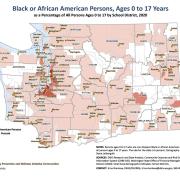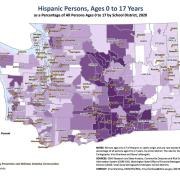Community Prevention and Wellness Initiative (CPWI)
In 2011, the Division of Behavioral Health and Recovery launched the Community Prevention and Wellness Initiative (CPWI) to provide substance use disorder prevention services and strategies through local coalitions and schools in communities with higher need. Community coalitions have proven to be an effective organizing force for bringing evidence-based policies and programs to scale, improving public health.
Through partnerships with counties and school districts across Washington, the Office of Superintendent of Public Instruction, and Educational Service Districts, CPWI is implemented statewide in:
-
Nearly 100 communities
-
All 39 counties
-
All 9 Educational Service Districts

Click the maps below to view CPWI locations in relation to black, indigenous, and persons of color (BIPOC) youth populations:
| BIPOC |
Black or |
Indigenous or Native American |
Asian or Pacific Islander |
Hispanic |
 |
 |
 |
 |
 |
CPWI is a community coalition and school-based model for delivering prevention programs and strategies to reduce underage misuse of alcohol, marijuana, opioids, tobacco, and other drugs and substance use disorder. This model uses a data-informed, community-level decision making process to determine root social and emotional causes that predict problem behaviors.
CPWI focuses on:
Building healthy and safe community environments
Expanding quality preventive services in community and school settings
Empowering people to make healthy choices
Eliminating health disparities
The CPWI model allows us to better allocate and leverage limited public resources, increasing our ability to gain the best possible outcomes for communities. This more collaborative approach is expected to provide the long-term support needed for positive community change.
How do we know prevention works?
Over 70 prevention programs and policies have been shown through rigorous research to prevent substance use problems, with nearly 30 shown to promote mental health and/or prevent suicide.
An evaluation by Washington State University shows that CPWI is meeting its goals: 95% of programs implemented between July 2015 and June 2016 had positive results in delaying the first use of alcohol or other drugs, reducing use, decreasing risk factors and/or increasing protective factors. Between 2011 and 2016, communities in Cohort 1 showed improvements in all family and community risk factors. Evaluation results also showed significant decreases in 10th grade substance use outcomes:
- Alcohol use and binge drinking - down 42%
- Cigarette use - down 49%
- Marijuana use - down 11%
Join our newsletter
Interested in staying up to date on CPWI? Join the Athena prevention newsletter to receive notifications and updates. Click to subscribe.
Kasey Kates
CPWI and School-Based Services Supervisor
Kasey.Kates@hca.wa.gov



